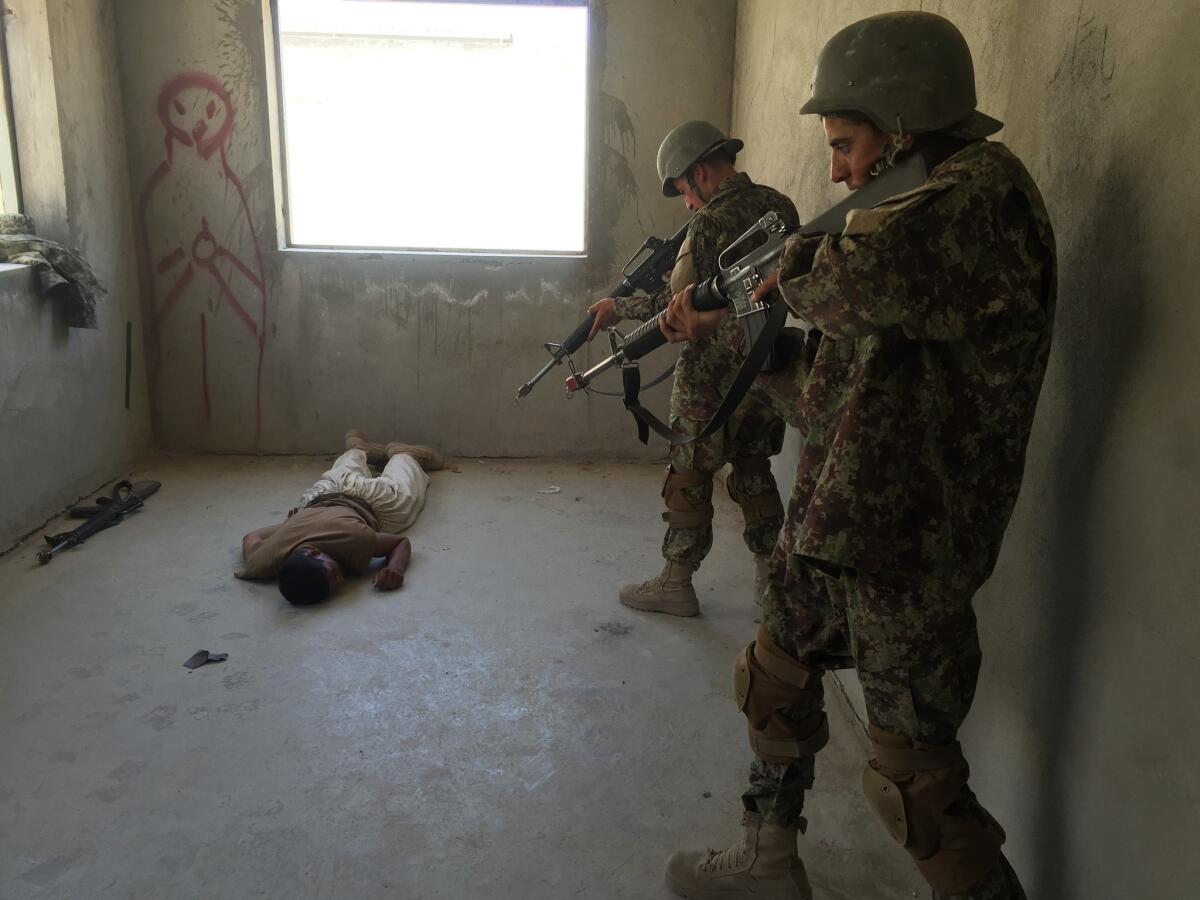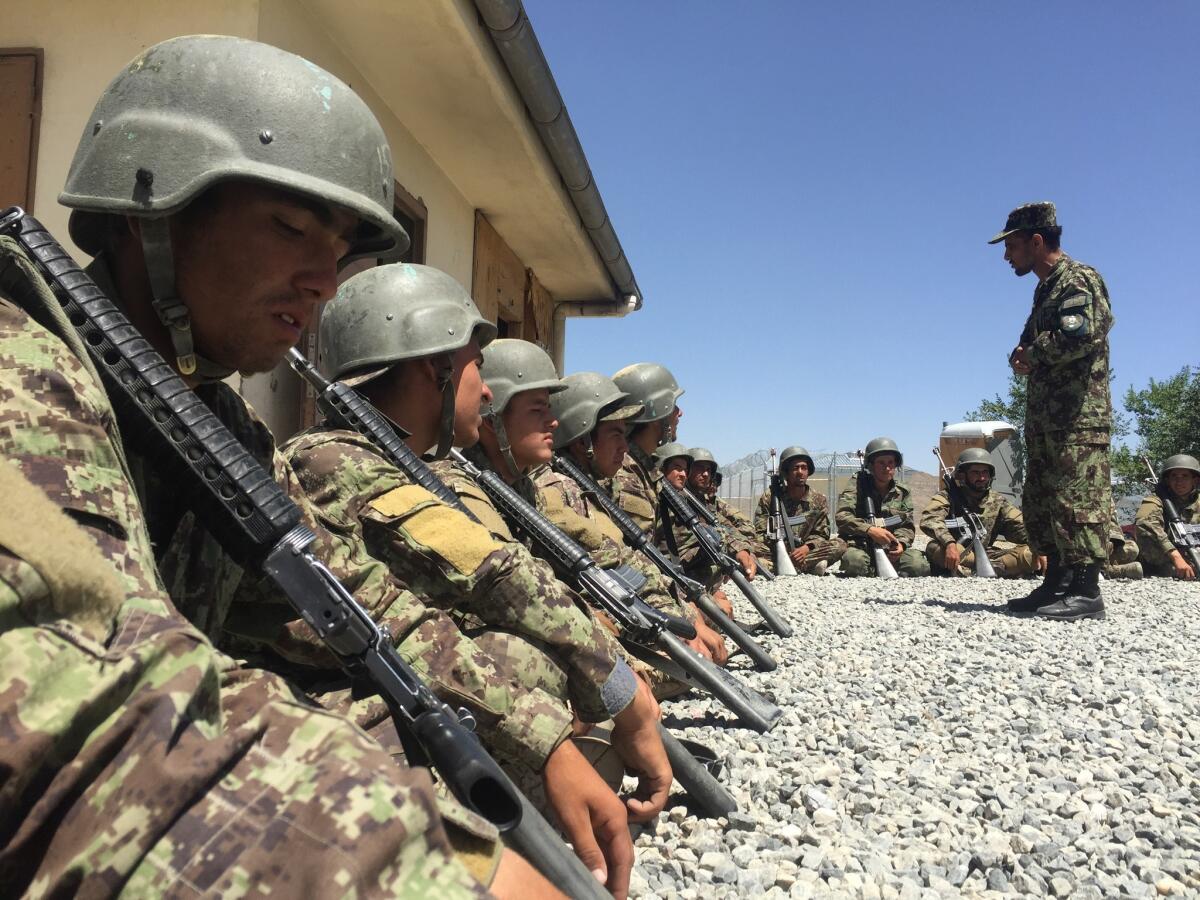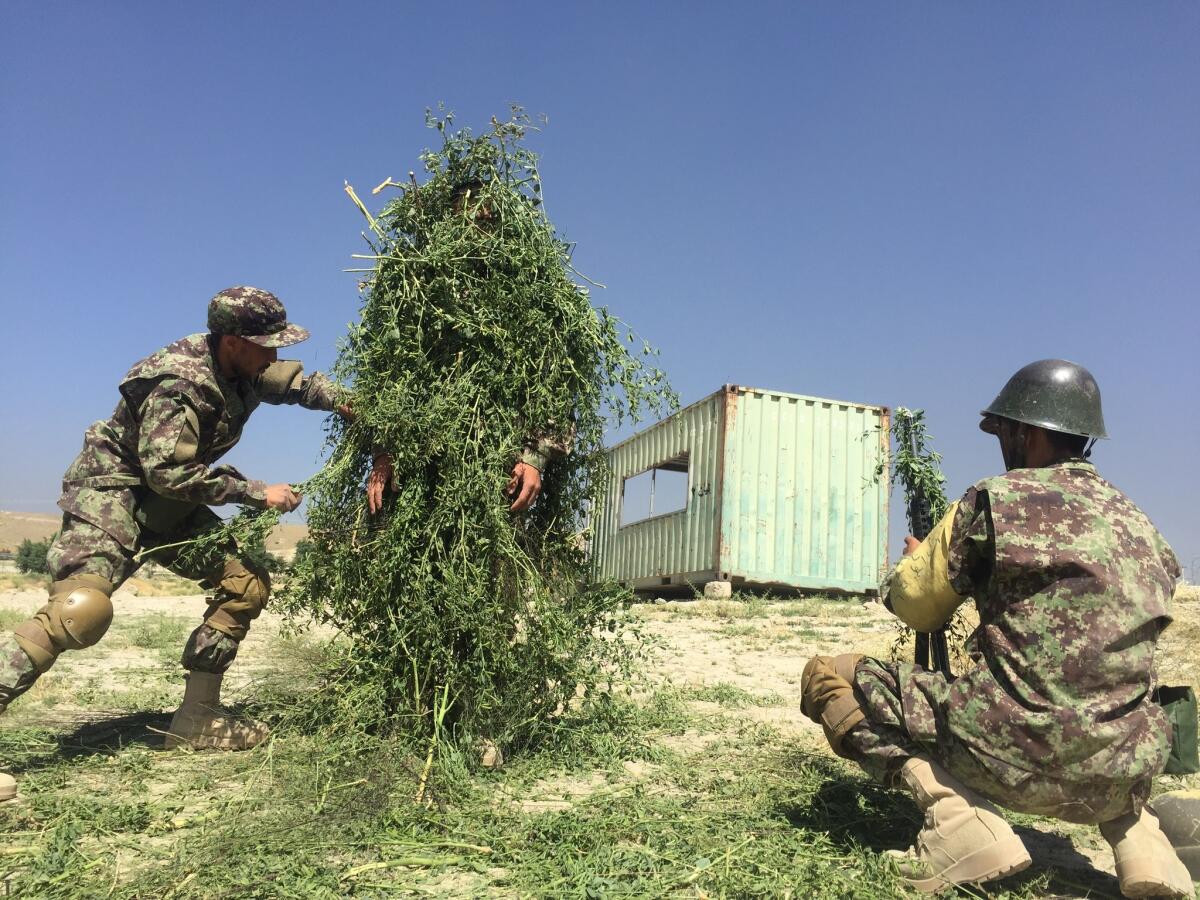Afghan army recruits prepare to deploy into an increasingly deadly war

It took two months for Zia-ul Haq, 23, to persuade his family to let him join the Afghan National Army.
Like hundreds of recruits at an army training center outside Kabul, he said he was driven by patriotism and a desire to defend his country. But his family, which hails from Logar province, a hotbed of fighters claiming allegiance to the Taliban, Islamic State and other militant groups, was reluctant for him to enter a war now in its 15th year.
“They didn’t want me to join,” he said. “They were against it from the beginning.”
That is because Afghan soldiers and police, who took over responsibility for leading the war from U.S.-led coalition forces a year and a half ago, face ever-greater dangers.
As Taliban fighters increase their attacks and target urban centers, Afghan forces have struggled to defend themselves and hold onto territory with diminished support from coalition combat soldiers and aircraft.
In 2015, casualties among Afghan soldiers and police rose 27% from Jan. 1 to Nov. 15, compared to the same period in 2014, according to a Pentagon report.
The growing risks have contributed to high rates of attrition among Afghan soldiers, which the Pentagon said could “pose significant challenges to retaining a professional force.”
“As many recruits as there are, there are as many desertions,” said one Afghan military officer at the training center, who was not authorized to speak to the media.
NEWSLETTER: Get the day’s top headlines from Times Editor Davan Maharaj >>
Despite the risks, up to 6,000 young men — and a small but growing number of women — continue to enlist each month in the army, according to Afghan defense ministry figures.
Many say they join out of patriotism, but a significant number also are drawn by the $165 monthly salary — a rare steady paycheck in a country with an estimated 40% unemployment rate and an economy that has nosedived since the disputed 2014 presidential election.
The challenges facing the Afghan forces were on display at the army’s main training center, a sprawling campus in the hills east of Kabul. During the just-concluded Muslim holy month of Ramadan, during which able-bodied Muslims fast from sunrise or sunset, the recruits simulated battle conditions without food or water, in dry summer heat.
On the battlefield, as well, military officials said soldiers and police were observing the fast.
“Nothing — not the heat, not the cold, nothing — can affect a soldier,” said Obaidullah, an 18-year-old from the northern province of Takhar, as fellow recruits practiced covering themselves in leaves and branches as part of training on concealing themselves from the enemy. Like many Afghans, Obaidullah has only one name.
The three-month training includes firing sessions, assembling and dismantling weaponry and field operations, after which recruits are sent out into the war.

Sgt. Maazullah, a trainer demonstrating trench warfare techniques, said the nine-week training period wasn’t sufficient to prepare troops for the challenges of the Afghan battlefield. By comparison, U.S. Army basic training lasts 10 weeks.
Low literacy levels among the recruits slow the training, but officers say they need to replace soldiers quickly because of high rates of casualties and desertions.
“The excess of the subjects that must be taught in a very short period of time definitely leads to real difficulties on the front lines,” the sergeant said.
Although Afghan politicians, celebrities, activists and media try to drum up public support for Afghan security forces, the army and police have faced controversy — perhaps no more so than with the practice of night raids into Afghan houses in search of insurgent suspects.
In 2013, then-President Hamid Karzai banned foreign forces from entering Afghan houses during the raids after repeated reports of abuses. Afghan forces continued the practice but under stricter scrutiny from military officials.

In January, residents in the eastern province of Paktia accused Afghan soldiers of carrying out indiscriminate shelling and other practices that caused a high number of civilian casualties during a 10-day operation in Zurmat district.
Among the allegations were that soldiers used schools and houses as bases from which they would battle Taliban fighters.
Atop a hill in the training center, two dozen new recruits — including one dressed to look like an enemy combatant — walked through the steps of a raid. Circling the perimeter of a mock multilevel house, the soldiers pointed their guns at red ghostly outlines meant to represent opposition fighters.
Sgt. Hamidullah, a portly trainer from eastern Afghanistan, gave detailed instructions in Pashto and Dari in a loud, stern voice. He said the soldiers are told to make every effort to avoid civilian casualties.
“We move in stages, hoping to further encircle the enemy with each step,” Hamidullah said. “We announce three times over a loudspeaker that we are only here for fighters and that all non-combatants should escape the premises.
“We cut off all communication channels for the enemy, and we ask for the help of elders in the community to convince the enemies to turn themselves in.”
The exercise lasts one day — but Hamidullah said he needed “at the very least, two days” to conduct it adequately.
Zia-ul Haq, the recruit from Logar, was among those carrying out the mock night raid. When it was over, he wore a look of pride.
“After I complete my training and become a good soldier, I want to move on to training to become a sergeant.”
Latifi and Faizy are special correspondents.
ALSO
When it comes to raising a child disabled by Zika, Brazilian women often do it alone
Brazilian police arrest 10 suspected of planning for terrorist attack around Olympics
French prosecutor says killer of 84 in Nice had accomplices and planned attack for months
More to Read
Start your day right
Sign up for Essential California for news, features and recommendations from the L.A. Times and beyond in your inbox six days a week.
You may occasionally receive promotional content from the Los Angeles Times.






